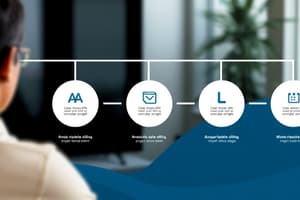Podcast
Questions and Answers
What is the first phase of the Waterfall project management lifecycle?
What is the first phase of the Waterfall project management lifecycle?
- Closure
- Execution
- Planning
- Initiation (correct)
In which scenario is the Waterfall approach typically recommended?
In which scenario is the Waterfall approach typically recommended?
- When project requirements are likely to change frequently
- When flexibility in project management is crucial
- When detailed upfront planning is possible (correct)
- When the technology being used is new and untested
Which characteristic of the Waterfall method is related to its structured approach?
Which characteristic of the Waterfall method is related to its structured approach?
- Focus on rapid iterations
- Clear milestones and deliverables (correct)
- Frequent adjustments during the project
- Emphasis on team collaboration
What happens if there are frequent changes in project scope while using the Waterfall method?
What happens if there are frequent changes in project scope while using the Waterfall method?
Which type of projects is least suitable for the Waterfall approach?
Which type of projects is least suitable for the Waterfall approach?
Why is strong upfront planning important in the Waterfall method?
Why is strong upfront planning important in the Waterfall method?
What is a potential disadvantage of using the Waterfall method?
What is a potential disadvantage of using the Waterfall method?
Which of the following is NOT considered a characteristic of the Waterfall method?
Which of the following is NOT considered a characteristic of the Waterfall method?
Flashcards
Waterfall Method
Waterfall Method
A sequential project management framework with defined phases.
Phases of Waterfall
Phases of Waterfall
The five phases are Initiation, Planning, Execution, Monitoring & Control, Closure.
Well-defined requirements
Well-defined requirements
Clear and stable project requirements ideally suited for Waterfall.
Limited scope changes
Limited scope changes
Signup and view all the flashcards
Mature technology
Mature technology
Signup and view all the flashcards
Focus on predictability
Focus on predictability
Signup and view all the flashcards
Strong upfront planning
Strong upfront planning
Signup and view all the flashcards
Examples of Waterfall projects
Examples of Waterfall projects
Signup and view all the flashcards
Study Notes
Waterfall Project Management
- Waterfall project management has five phases: Initiation, Planning, Execution, Monitoring & Control, and Closure.
- Waterfall is appropriate when project requirements are clear, stable, and unlikely to change.
Waterfall Success Factors
- Well-defined requirements: Clear and stable requirements throughout the project lifecycle are essential.
- Limited scope changes: Minimal anticipated changes in scope or requirements help maintain a predictable flow. Frequent modifications can disrupt the process.
- Mature technology: Use of established and well-understood technologies reduces uncertainty.
- Predictability: Focus on clear milestones and deliverables, enabling effective progress tracking. Strong upfront planning is essential to detailed project planning.
- Strong upfront planning: This allows adequate time and resources to focus on detailed planning at the project's start.
Waterfall Examples
- Developing a new software version based on existing technology.
- Upgrading a company's existing server infrastructure with established technology.
- Constructing a building with detailed blueprints and specifications.
Agile Project Management
- Agile project methodologies prioritize flexibility and continuous adaptation.
Studying That Suits You
Use AI to generate personalized quizzes and flashcards to suit your learning preferences.




